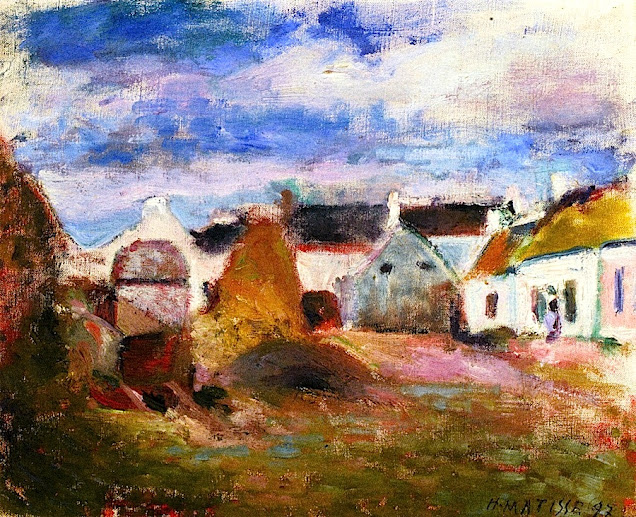Henri Matisse (French, 1869 – 1954)
Pont Saint-Michel, Paris - circa 1895-1897
Britanny, 1896
Toulouse Landscape, 1898-1899
Belle Isle Tempête
Farmyard in Brittany, 1897
Farms in Brittany, Belle-Ile
Time extracts various values from a painter’s work. When these values are exhausted the pictures are forgotten, and the more a picture has to give, the greater it is.
Paysage de Bretagne, circa 1890-1900
Landscape, Corsica, 1898
Sunset in Corsica, 1898
Green needles on the Cross Javernaz, 1901
Notre Dame sunrise, 1902
The path in the bois de boulogne (1902)
Une Rue À Arcueil 1903-4
View of the Seine, the Pont Saint Michel (1904)
The Terrace, St. Tropez (1904)
View of Collioure with Church, 1905
The Joy of Life (study), 1905
Storm in Nice
Dance (1909-1910)
View of Collioure and the Sea (1911)
Landscape Viewed from a Window, 1912-13
Olive Trees, Renoir’s Garden in Cagnes, 1917
Cagnes, Landscape in Stormy Weather, 1917

Henri Matisse - Landscape with Olive Trees 1918
In the Nice Countryside, Garden of Irisises, 1919
The Path of Olive Trees, 1920
Ropes on the Beach at Etretat, circa 1920
Landscape of the Midi - before the Storm - circa 1921
The Sea 1921
Two Figures near the Le Loup River, 1922
Anemones in an Earthenware Vase (1924)
"There is nothing more difficult for a truly creative painter than to paint a rose, because before he can do so he has first to forget all the roses that were ever painted."
Rocks in the Vallée du Loup, 1925
The Guignon
The Dream (1935)
Pink Nude Seated (1935)

Face of a Woman (1935)
Hermitage, Saint Petersburg
Jazz 1946-1947
The Rocaille Armchair (1946)
Torse Nu, s.d.
The Silence Living in Houses (1947)
Portrait of Lydia Delectorskaya, the Artist's Secretary, 1947
Blue Nude I (1952),
paper cutouts painted in gouache glued on paper on canvas

The Flowing Hair
Landscape
Toulouse Landscape
Henri Matisse, Paris, Henri Cartier-Bresson
“You must forget all your theories, all your ideas before the subject. What part of these is really your own will be expressed in your expression of the emotion awakened in you by the subject.” ― Henri Matisse
Henri-Émile-Benoît Matisse (31 December 1869 – 3 November 1954) was a French artist, known for his use of colour and his fluid and original draughtsmanship. He was a draughtsman, printmaker, and sculptor, but is known primarily as a painter. Matisse is commonly regarded, along with Pablo Picasso and Marcel Duchamp, as one of the three artists who helped to define the revolutionary developments in the plastic arts in the opening decades of the 20th century, responsible for significant developments in painting and sculpture. Although he was initially labelled a Fauve (wild beast), by the 1920s he was increasingly hailed as an upholder of the classical tradition in French painting. His mastery of the expressive language of colour and drawing, displayed in a body of work spanning over a half-century, won him recognition as a leading figure in modern art.
source: wikipedia






%20oil%20on%20cardboard%20mounted%20on%20plywood.jpg)





.jpg)




,+1905.jpg)
















.jpg)

.jpg)






,+paper+cutouts+painted+in+gouache+glued+on+paper+on+canvas.jpg)



No comments:
Post a Comment